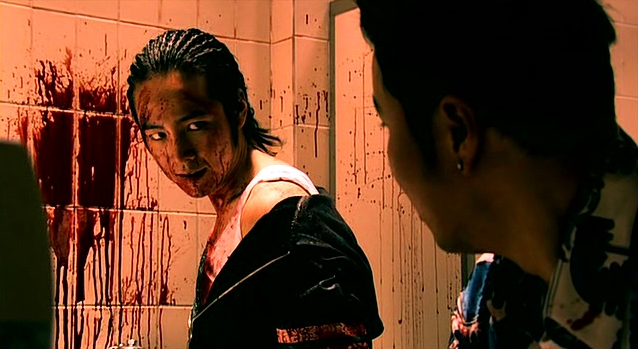The infamous Itaewon murder finally saw some justice. American Arthur John Patterson was sentenced to 20 years in jail, 18 years and 9 months after the crime occurred. The tragedy had been swept aside because the prime suspect escaped to his home country. There are still many unresolved crimes committed by foreigners due to legal complications. For example, Korean prosecution cannot always direct legal punishment in cases of crimes committed by US forces in Korea. What are the reasons for this obstruction of justice? Why did it take so long for Patterson to be sentenced? The Dankook Herald (DKH) examined the incidence of foreign criminal activity.
The Itaewon murder case took place in the restroom of a fast food restaurant in 1997 where 22 years old Jo Jung-pil was stabbed to death. The prosecution indicted Edward Lee for the murder and Arthur Patterson for destruction of evidence and possession of a deadly weapon. However, the main suspects, Arthur Patterson and Edward Lee, were not adequately punished. Edward Lee was released due to lack of evidence and Arthur Patterson, after serving about 8 months for possession of an illegal weapon, returned to the USA. In Patterson’s case, he was able to flee the country because the prosecution failed to issue an overseas travel ban.
 |
| ▲ A scene from ‘Where the Truth Lies’ based on the Itaewon murder case. |
The DKH asked Prof. Lee Seok-bae (Dept. of Law) about the application of the law on foreigners. “There is no special law for foreigners except the SOFA. Personally, I think any revisions to the law would not effectively prevent incidents like the Patterson case. In reality, crimes, such as murder, theft, and fraud, happen even though a law exists. Moreover, the reason why Patterson was able to flee was because of an error on the part of our prosecution” he said.
Mr. Lee also addressed the Habeas Corpus law. Habeas Corpus is recourse in law, whereby a person can report an unlawful detention or imprisonment before a court, usually through a prison official. Arthur Patterson submitted a habeas corpus petition to the federal court in the USA and it delayed his extradition to Korea, although the petition was dismissed in the end. “Some people blame the habeas corpus petition of Patterson for the delay, but the petition was his right to execute, so there was no problem with it,” he explained.
Crimes committed by foreign nationals, especially US Forces in Korea (USFK) can be particularly heinous. Yoon Geum-yi was murdered on October 28, 1992. She was 26 years old and worked in a club located in Bo-san-dong, Dongducheon city. Her body was found with two beer bottles and a coke bottle in her uterus, an umbrella stuck in her anus and matchsticks in her mouth. This horrible crime was committed by Kenneth Lee Mackle, a 20 years old soldier serving in the USFK division 2 as a private. He had trouble in college, so he joined the army to escape the police dragnet. He learned that his colleague Rambert was having a relationship with Ms. Yoon and he murdered her. He was sentenced to 15 years, but was released on parole a year before his sentence was completed and flew back to West Virginia the next day, on Oct. 14, 2006.
The DKH also looked into the so-called ‘Yangju highway incident’ that was also committed by USFK. On June 13, 2002 around 10:45 a.m., a US army armored vehicle killed two middle school students Shin Hyo-sun and Shim Mi-seon in Gwangjeok-myeon, Yangju city. The family of the deceased and Korean society brought the incident to the Justice Department, but the US Forces authority turned the request down. US army claimed that they had jurisdiction on the matter, and it was handled by the military court at the Dongducheon base. The driver of the armored vehicle, Sergeant Mark Walker and Fernando Nino received verdict of not guilty.
The lukewarm consequence of the incident was based on the US-ROK Status of Forces Agreement (SOFA). The SOFA is an agreement between South Korea and the US approved and enacted in 1967 and revised in 1991 and 2001. In general, foreign armed forces have to follow the law of their host nations, but for the efficiency of special missions, host nations have to provide for accommodations partly under the agreement of both countries and the SOFA corresponds to this rule.
Protection of our citizens against the actions of criminals or the loopholes under authorities like SOFA must be addressed and reformed. We also have to put more effort into solving the unsolved crimes committed by foreigners. Thanks to constant protests by the public, unjust incidents like the Itaewon murder case were resolved. There is always a chance for misunderstanding or mistakes when handling cases. So our job is to stay objective and make the best judgements and decisions. If there is no automatic and appropriate action, society has a responsibility to take up the challenge for peace and a better future.
Kim Gang-san, Yoon Ji-hyo 140339@naver.com

![[Campus Magnifier] Let's Surf the Library!](/news/photo/202404/12496_1765_4143.jpg) [Campus Magnifier] Let's Surf the Library!
[Campus Magnifier] Let's Surf the Library!
![[Campus Magnifier] Let's Surf the Library!](/news/thumbnail/202404/12496_1765_4143_v150.jpg)





